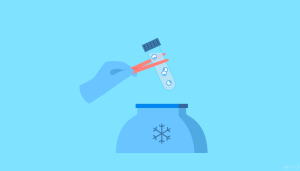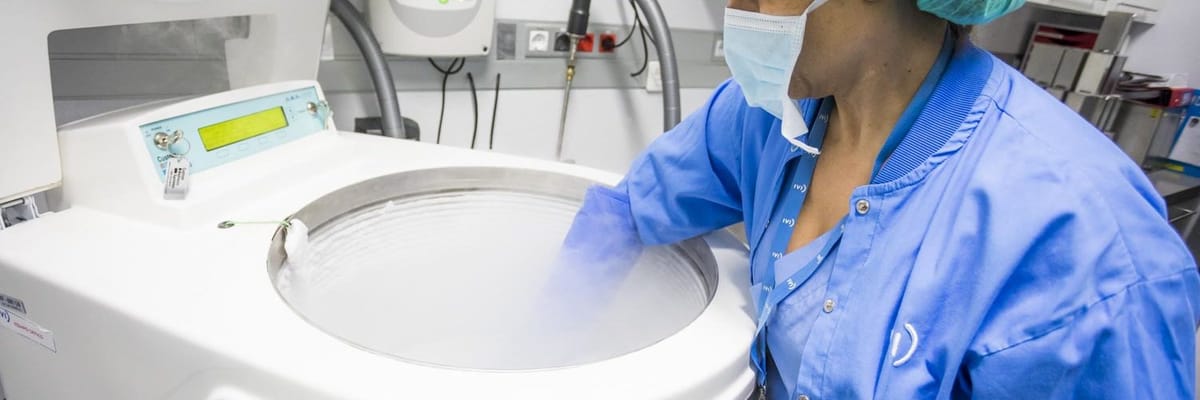
The technology that allows for freezing of eggs rather than embryos has only been with us for a relatively short time, since 1986. During that brief period, egg freezing has increased significantly. Why is this? The is one simple answer. In a world where societal, work and relationship norms are constantly evolving, one thing that never changes is the relentless ticking of the female body clock.
Egg freezing is one way of dealing with the extraordinary pressures that this creates for women trying to balance social considerations with the desire to become mothers one day. The big question is, when? At what age can you freeze eggs with a reasonable chance of a successful outcome? Is freezing eggs at 40 possible and, if so, is it a good idea?
What is Egg Freezing
Egg freezing is a procedure in which a woman’s eggs are stored for future use in fertility treatment. It can be carried out for medical or elective reasons. In a sense, egg freezing became possible as a by-product of the well-known IVF procedure. A woman’s ovaries are stimulated to produce multiple oocytes which are then fertilized in the laboratory. The best of the resulting embryos will be transferred to the maternal uterus. Egg freezing interrupts the IVF process in that after collection, the eggs are frozen and stored for future use. When the time comes, the eggs are thawed and fertilized and the IVF process continues in the normal way.
The method now widely used is known as vitrification, or cryopreservation of oocytes. This method is significantly more effective. It is the one used in our IVI clinics. We have developed the vitrification of oocytes to the extent that there is a survival rate of around 97%. We obtain the same clinical results as with the use of fresh oocytes.

The biological clock and fertility
The age at which you freeze your eggs is the absolute crux of the matter. It is well known that a woman’s natural fertility starts to decline around the age of 30. It decreases more sharply around the age of 35. This is due to not only a depletion of the ovarian reserve, but also a decline in the quality of the eggs that remain. Put bluntly, older eggs are more likely to have chromosomal abnormalities. This is why women who become pregnant in their early forties have a 40% chance of miscarriage, compared with under 15% for someone in her early twenties.
What is the best age to freeze eggs?
Can I freeze my eggs at 40? May women ask this question. Research has confirmed that the rate of successful outcome decreases as a direct corollary to the increased age of the woman at egg collection. The highest rates are for eggs collected under the age of 35. The age at thaw, by contrast, shows no such correlation, with success rates being relatively stable over all age ranges. Your overall chance of becoming pregnant with the use of your own frozen eggs is between 60% and 30%, depending on your age at the time of freezing. Many experts consider that there would be little point in egg freezing at 40 or later. The chances of miscarriage or foetal anomalies increase and the pregnancy rate is very low in these circumstances.
Pros and cons of egg freezing at 40
As a result of what we explained earlier, the main disadvantage of freezing eggs for a later pregnancy at 40 is that the quality may be low, affecting the chances of pregnancy.
It is a point worth noting here that a woman’s ‘body clock’ applies specifically to her ovaries and not to her womb. Eggs frozen at a particular age retain the qualities they had at the time of collection. This means that egg freezing allows for the use of ‘young’ eggs in an older uterus, even if you decide to fertilize and implant these at the age of 40 or 45.
The egg freezing procedure
Freezing eggs for a later pregnancy involves the same initial steps as an in vitro fertilization treatment:
- Hormonal stimulation
- Ultrasound monitoring
- Egg retrieval
Once the patient’s eggs are obtained, they are assessed and prepared in the laboratory. The embryologists freeze the mature ones with the best chances of successful fertilization. The doctor will determine if the patient needs to undergo another stimulation cycle to vitrify a larger number of oocytes.
What is the egg freezing success rate?
IVI has pioneered the use of Cryotop, the newest and most effective technique for gamete vitrification. Thanks to this method, survival rates after devitrification are close to 97% in patients under 35 years old, with implantation rates of 40% and pregnancy rates of 60%.
The Cost of Egg Freezing
The prices for oocyte vitrification are available on our website. It is always necessary to conduct a preliminary evaluation of the patient to determine if this technique is suitable for her fertility status.
Finding out more about freezing eggs at 40
In spite of these different regulatory climates, the message is consistent and clear. The younger a woman is when she freezes her eggs, the better the outcome. Before 35 is best, 38 at the latest. Freezing eggs at 40 currently has a very low success rate.
These are the main profiles of patients who undergo this treatment:
- Women who wish to postpone motherhood
- Oncology patients
- Patients who need to undergo gynecological surgeries
- Patients who, for medical reasons, need to preserve oocytes for use in another cycle
- Patients who, due to low ovarian response, need to accumulate a certain number of oocytes
How long can you freeze eggs for IVF? Eggs can remain stored until the patient decides the time has come to start her motherhood journey.
If you would like to find out more, just use our online contact form or give us a call.





Comments are closed here.